情态动词全解析
2010高考英语情态动词全解析
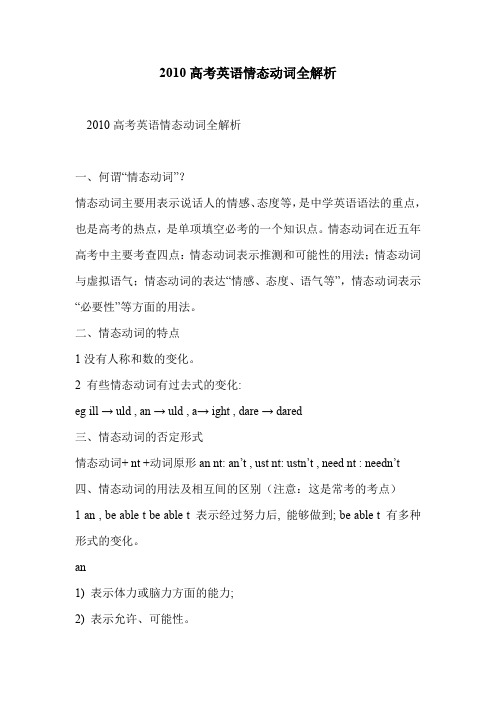
2010高考英语情态动词全解析2010高考英语情态动词全解析一、何谓“情态动词”?情态动词主要用表示说话人的情感、态度等,是中学英语语法的重点,也是高考的热点,是单项填空必考的一个知识点。
情态动词在近五年高考中主要考查四点:情态动词表示推测和可能性的用法;情态动词与虚拟语气;情态动词的表达“情感、态度、语气等”,情态动词表示“必要性”等方面的用法。
二、情态动词的特点1没有人称和数的变化。
2 有些情态动词有过去式的变化:eg ill → uld , an → uld ,a→ ight , dare → dared三、情态动词的否定形式情态动词+ nt +动词原形an nt: an’t , ust nt: ustn’t , need nt : needn’t四、情态动词的用法及相互间的区别(注意:这是常考的考点)1 an , be able t be able t 表示经过努力后, 能够做到; be able t 有多种形式的变化。
an1) 表示体力或脑力方面的能力;2) 表示允许、可能性。
uld 是an的过去式, 表示过去有能力及过去存在的可能性; 用于疑问句表示委婉地提出问题。
1) The fire spread thrugh the htel ver quil but everne ____ get utA had tB uld uld D as able t2) -ill u sta fr lunh?-Srr, __ brther is ing t see eA I ustn’tB I an’t I needn’t D I n’t2a 表示询问或说明一事可不可做; 表示某事有可能发生。
ight是a的过去式; 用在疑问中比a委婉、客气。
1) -a I tae this b ut f the reading-r?-N, u ustn’t ( es, u a)2) -ight I ae a suggestin? -es, u a3 ust1) 表示必须要做的事: 必须2) 表示很有把握的推断: 一定, 准是。
【英语】英语情态动词用法详解

【英语】英语情态动词用法详解一、单项选择情态动词1.---Artistic people can be very difficult sometimes.---Well, you______know---you married one.A.might B.would C.shall D.should【答案】D【解析】【详解】考查情态动词词义辨析。
A. might可能,也许;B. would将会;C. shall必须,会;D. should 应该。
句意:---有艺术修养的人有时很难相处。
---你应当知道这一点,因为你结婚那位就是搞艺术的。
这里是按照常理推断,用should。
2.Most of the top leaders expressed a common desire at the UN conference, ______ that different cultures ______ coexist with tolerance.A.the one ; must B.the one ; should C.one ; must D.one ; should【答案】D【解析】【详解】考查替代和情态动词。
句意:大多数高层领导人在联合国大会上表达了一个共同的愿望,即不同的文化应该与宽容共存。
大多数高层领导人在联合国大会上表达了一个共同的愿望,即不同的文化应该与宽容共存。
替代表泛指的单数名词,通常用one替代。
此处用one替代前面的a desire,是同位语;结合句意第二空用情态动词should“应该”。
故选D。
【点睛】that ,it ,one 代指前面的名词时的用法1.one 指代前面出现的可数名词,是泛指。
可以和冠词连用,也可以有自己的定语。
一般不能用做特指,但和定冠词连用时可以是特指。
如: Please show me the cup, the red one on the shelf.2.It 指代前面提到的单数名词,相当于the one。
英语情态动词用法总结(完整)

英语情态动词用法总结(完整)一、单项选择情态动词1.--- Difficulties always go with me!--- Cheer up! If God closes door in front of you, there be a window opened for you. A.must B.wouldC.could D.can【答案】A【解析】【详解】考查情态动词辨析。
句意:——困难总是伴随着我!——高兴点! 如果上帝在你面前关上了门,一定有一扇窗户为你打开。
A. must必须;B. would将要;C. could能,会;D. can能,会。
must表示对现在的状态推测时,意为“一定”,表示可能性很大的推测。
符合语境。
故选A。
【点睛】1) must用在肯定句中表示较有把握的推测,意为"一定"。
2) must表对现在的状态或现在正发生的事情的推测时, must 后面通常接系动词be 的原形或行为动词的进行式。
3) must 表示对已发生的事情的推测时,must 要接完成式。
4) must表示对过去某时正发生的事情的推测,must 后面要接完成进行式。
5) 否定推测用can't。
本句中的。
must表示对现在的状态推测时,意为一定,表示可能性很大的推测。
符合第2点用法。
2.--- Oh, my God! I just missed the last bus back home.--- That’s really bad. I’m sure you ______ it, but you just didn’t hurry up.A.had caught B.could have caught C.could catch D.can catch【答案】B【解析】【详解】考查情态动词+have done结构。
句意:——哦,我的上帝!我刚好错过了回家的末班车。
——这是非常糟糕的。
透析中考英语语法情态动词考点
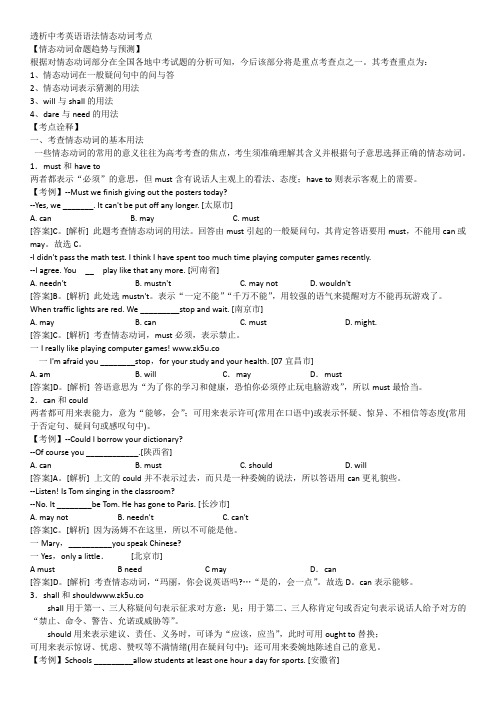
透析中考英语语法情态动词考点【情态动词命题趋势与预测】根据对情态动词部分在全国各地中考试题的分析可知,今后该部分将是重点考查点之一。
其考查重点为:1、情态动词在一般疑问句中的问与答2、情态动词表示猜测的用法3、will与shall的用法4、dare与need的用法【考点诠释】一、考查情态动词的基本用法一些情态动词的常用的意义往往为高考考查的焦点,考生须准确理解其含义并根据句子意思选择正确的情态动词。
1.must和have to两者都表示“必须”的意思,但must含有说话人主观上的看法、态度;have to则表示客观上的需要。
【考例】--Must we finish giving out the posters today?--Yes, we _______. It can't be put off any longer. [太原市]A. canB. mayC. must[答案]C。
[解析] 此题考查情态动词的用法。
回答由must引起的一般疑问句,其肯定答语要用must,不能用can或may。
故选C。
-I didn't pass the math test. I think I have spent too much time playing computer games recently.--I agree. You __ play like that any more. [河南省]A. needn'tB. mustn'tC. may notD. wouldn't[答案]B。
[解析] 此处选mustn't。
表示“一定不能”“千万不能”,用较强的语气来提醒对方不能再玩游戏了。
When traffic lights are red. We _________stop and wait. [南京市]A. mayB. canC. mustD. might.[答案]C。
高考英语情态动词和虚拟语气考点总结及真题解析

考点13 情态动词和虚拟语气【命题解读】英语中常用的情态动词主要有can,could,may,might,must,will,would,shall,should,ought to,dare,need,used to,had better等。
在学习情态动词时应注意以下几点:同一情态动词表示不同的意义的情况;情态动词后跟各种形式的用法;尤其要注意"情态动词+完成式"是高考中的重点所在。
对虚拟语气的考查重点在于根据句子的语境灵活多样地运用虚拟语气,宾语从句中虚拟语气的应用,交际用语中为表示委婉而使用的虚拟语气,含蓄条件句中的虚拟语气,以及特殊句型中的虚拟语气等。
【命题预测】情态动词是2021年各地高考试题中的必考项目,每年高考单独命题区的单项填空必有一道考查情态动词的项目。
新课标卷主要在语法填空和短文改错中考查。
考点依次是:推测(可能性)→请求/允许→必要性→特殊用法。
试题的立意不偏不怪,但有效信息越来越隐蔽,语境越来越真实,考查角度越来越细致,这些因素在很大程度上增加了试题的难度。
情态动词和虚拟语气与动词的时态和语态相结合的考查是近年来高考的趋势。
【复习建议】情态动词:1. 掌握情态动词的基本用法;2. 掌握情态动词表达"情感、态度、语气等"方面的用法。
虚拟语气:1. 掌握虚拟语气的基本用法;2. 掌握含蓄虚拟条件句的用法;3. 掌握主从句时间不一致的虚拟条件句的用法;情态动词考向一情态动词的基本用法1)can,could与be able to1.表示能力,意为"能,会"。
☞Many people can use the computer.许多人会用电脑。
☞If you have a good sleep,you will be able to work out this problem.如果你好好睡一觉,你将能够解出这道题。
☞I could have worked out the problem,but I was too nervous.我本来可以解决这个问题,但我太紧张了。
初二英语情态动词的具体用法全面解析

初二英语情态动词的具体用法全面解析【考纲解读】根据对情态动词部分在全国各地中考试题的分析可知,今后该部分将是重点考查点之一。
其考查重点为:1、情态动词在一般疑问句中的问与答2、情态动词表示猜测的用法3、will与shall的用法4、dare与need的用法【知识点梳理】情态动词的具体用法:(一)情态动词概说1.情态动词也是“辅助性”动词,用来表示说话人的语气或情态。
情态动词所表示的情态有:请求、命令、允诺、可能、需要、敢于、愿望、义务、能力等。
2.情态动词本身有词义,但词义不完全,不能单独用作谓语,没有人称和数的变化,且后面只跟动词原形。
如:她会唱英文歌曲。
She cans sing an English song.(F)She can sings an English song.(F)She can sing an English song.(T)3.有些情态动词的过去时与其原形相同,有些与原形不同。
(1) 与原形相同的有:must --- must ought to --- ought to(2) 与原形不同的有:can --- could will --- wouldmay --- might shall --- shouldneed --- needed dare --- dared have to --- had to(二)情态动词的种类:(见下表)(三)情态动词的否定形式:cannot --- can’t could not --- couldn’t may not--- mayn’tmight not--- mightn’t must not --- mustn’t will not --- won’twould not --- wouldn’t need not --- needn’t shall not --- shan’tshould not --- shouldn’t ought not --- oughtn’t dare not --- daren’t(四)常用情态动词的用法:1.can与could1). can(1)表示体力或脑力方面的“能力”,也能表示根据客观条件能做某事的“能力”。
全面解析初中英语情态动词100例与答案
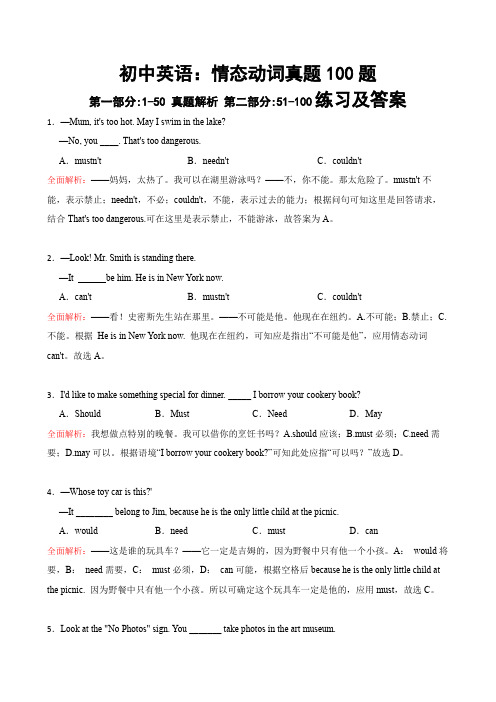
初中英语:情态动词真题100题第一部分:1-50 真题解析第二部分:51-100练习及答案1.—Mum, it's too hot. May I swim in the lake?—No, you ____. That's too dangerous.A.mustn't B.needn't C.couldn't全面解析:——妈妈,太热了。
我可以在湖里游泳吗?——不,你不能。
那太危险了。
mustn't不能,表示禁止;needn't,不必;couldn't,不能,表示过去的能力;根据问句可知这里是回答请求,结合That's too dangerous.可在这里是表示禁止,不能游泳,故答案为A。
2.—Look! Mr. Smith is standing there.—It be him. He is in New York now.A.can't B.mustn't C.couldn't全面解析:——看!史密斯先生站在那里。
——不可能是他。
他现在在纽约。
A.不可能;B.禁止;C.不能。
根据He is in New York now. 他现在在纽约,可知应是指出“不可能是他”,应用情态动词can't。
故选A。
3.I'd like to make something special for dinner. _____ I borrow your cookery book?A.Should B.Must C.Need D.May全面解析:我想做点特别的晚餐。
我可以借你的烹饪书吗?A.should应该;B.must必须;C.need需要;D.may可以。
根据语境“I borrow your cookery book?”可知此处应指“可以吗?”故选D。
4.—Whose toy car is this?'—It ________ belong to Jim, because he is the only little child at the picnic.A.would B.need C.must D.can全面解析:——这是谁的玩具车?——它一定是吉姆的,因为野餐中只有他一个小孩。
初中英语情态动词解析
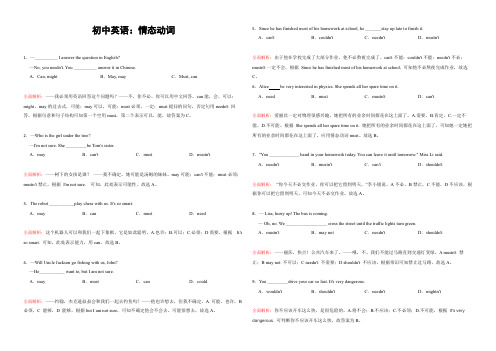
初中英语:情态动词1.—__________ I answer the question in English?—No, you needn't. You __________ answer it in Chinese.A.Can, might B.May, may C.Must, can全面解析:——我必须用英语回答这个问题吗?——不,你不必。
你可以用中文回答。
can能,会,可以;might,may的过去式,可能;may可以,可能;must必须,一定;must提问的问句,否定句用needn't 回答,根据句意和句子结构可知第一个空用must,第二个表示可以,能,故答案为C。
2.—Who is the girl under the tree?—I'm not sure. She _________be Tom's sister.A.may B.can't C.must D.mustn't全面解析:——树下的女孩是谁?——我不确定。
她可能是汤姆的妹妹。
may可能;can't不能;must必须;mustn't禁止。
根据I'm not sure. 可知,此处表示可能性。
故选A。
3.The robot ___________play chess with us. It's so smart.A.may B.can C.must D.need全面解析:这个机器人可以和我们一起下象棋。
它是如此聪明。
A.也许;B.可以;C.必须;D需要。
根据It's so smart. 可知,此处表示能力,用can,故选B。
4.—Will Uncle Jackson go fishing with us, John?—He___________ want to, but I am not sure.A.may B.must C.can D.could全面解析:——约翰,杰克逊叔叔会和我们一起去钓鱼吗?——他也许想去,但我不确定。
情态动词与虚拟语气 Word版含解析

专题七情态动词与虚拟语气情态动词的基本用法情态动词具有一定的词义,没有人称和数的变化,必须和其他动词一起构成谓语,用来表示愿望、态度或推测等。
1.表示能力(1)表示现在的能力⎩⎨⎧canam/is/are able to(2)表示将来的能力:will be able to (3)表示过去的能力⎩⎪⎨⎪⎧could 表示过去的能力,不表示是否做was/were able to 表示过去有能力做,并且成功地做了 相当于:managed to do sth. /succeeded in doing sth.could have done 表示过去本来能够做但未做I can 't promise anything, but I 'll do what I can . 我不能许诺什么,但我会尽力而为。
(表示现在的能力)The fire spread through the hotel very quickly but everyone was able to get out. 尽管这场大火迅速蔓延到了这个宾馆,但是每个人都逃了出去。
(表示过去有能力做并且成功地做了)I could have worked out the problem, but I was too nervous.我本来可以解出这道题,但我太紧张了。
(表示本来有能力做但未做) 2.表示推测(可能性)可能性可分为客观的可能性和具体事情实际发生的可能性两种。
(1)客观的可能性并不表示具体某事是否会发生,而用来说明人或事物的特征.........。
情态动词can 可用于肯定句中表示客观的(或理论的)可能性,而表示具体事情实际发生的可能性时, can 一般不用于肯定句。
Accidents can happen on such rainy days.在这样的多雨天气里可能会发生事故。
(表示客观的可能性) We may go to the cinema tonight, but we are not sure yet. 今晚我们可能去看电影,但还没确定。
【英语】高考英语易错题专题三情态动词(含解析)
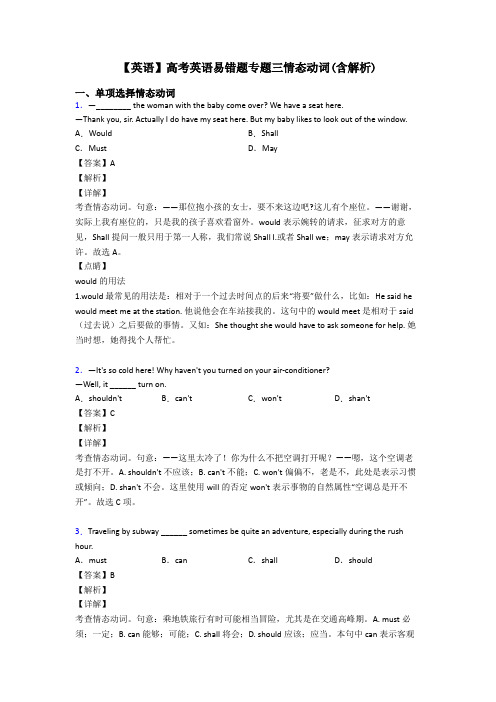
C.won'tD.shouldn't
【答案】D
【解析】
【详解】
考查情态动词。句意:我们不应该把拥有洁净的饮用水看作是理所当然的。也许有一天,我们会用完它。shouldn't“不应该”,符合句意。needn't不必;can't不可能;won't将不。故选D。
9.It_____ have been Tom that parked the car here, as he is the only one with a car.
12.One of our rules is that every student _______ wear school uniform while at school.
A.mightB.could
C.shallD.will
【答案】C
【解析】
【详解】
考查情态动词辨析。句意:我们其中一条规则要求每个学生在校期间都要穿校服。shall可以表示“命令,警告,强制要求;允诺;法律,规定要做……”,结合句意可知C正确。
I guess the poet would have been about twenty when she wrote her first poem.
13.It has been announced that all the candidates ___________ remain in their seats until all the papers have been collected.
A.shallB.could
C.wouldD.ought
【点睛】
would的用法
情态动词的用法
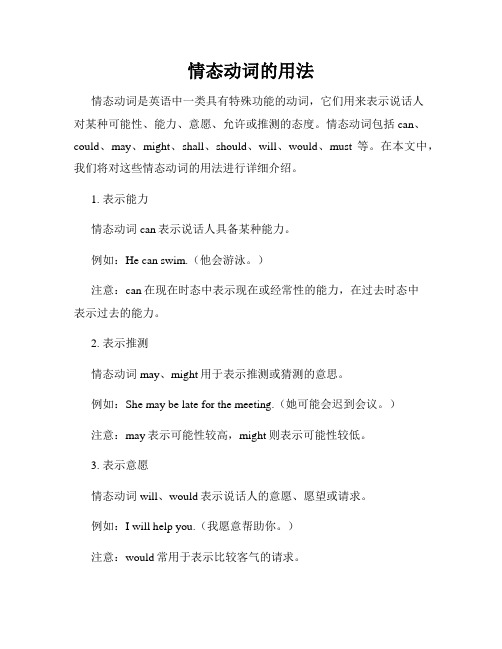
情态动词的用法情态动词是英语中一类具有特殊功能的动词,它们用来表示说话人对某种可能性、能力、意愿、允许或推测的态度。
情态动词包括can、could、may、might、shall、should、will、would、must等。
在本文中,我们将对这些情态动词的用法进行详细介绍。
1. 表示能力情态动词can表示说话人具备某种能力。
例如:He can swim.(他会游泳。
)注意:can在现在时态中表示现在或经常性的能力,在过去时态中表示过去的能力。
2. 表示推测情态动词may、might用于表示推测或猜测的意思。
例如:She may be late for the meeting.(她可能会迟到会议。
)注意:may表示可能性较高,might则表示可能性较低。
3. 表示意愿情态动词will、would表示说话人的意愿、愿望或请求。
例如:I will help you.(我愿意帮助你。
)注意:would常用于表示比较客气的请求。
4. 表示推测的过去情态动词must常用于表示对过去情况的推测或肯定。
例如:He must have missed the bus.(他肯定错过了公交车。
)注意:must用于表示对过去情况的肯定,而might用于表示对过去情况的推测。
5. 表示义务或必要性情态动词must表示对义务、必要性或确定性的肯定。
例如:You must finish your homework.(你必须完成作业。
)6. 表示建议或应该情态动词should表示建议或应该。
例如:You should go to bed early.(你应该早点睡觉。
)注意:should还可以表示对过去情况的推测,例如:He should have arrived by now.(他现在应该已经到达了。
)7. 表示允许或许可情态动词can与may可以用于表示许可或允许。
例如:Can I borrow your pen?(我可以借你的钢笔吗?)8. 表示可能性情态动词could用于表示可能性。
英语情态动词用法详解
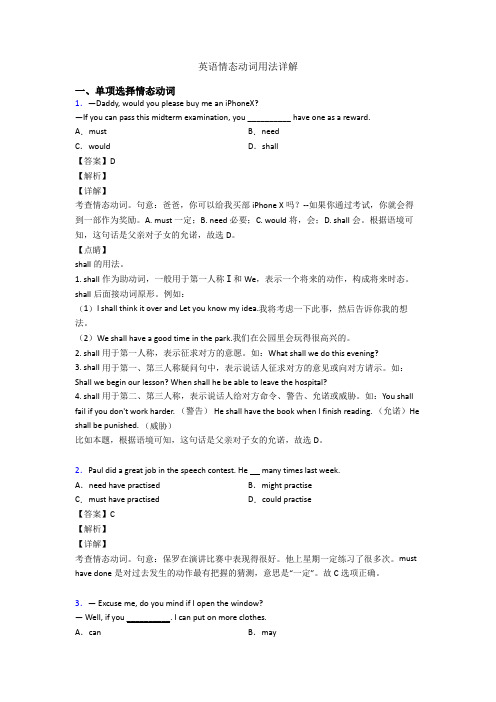
英语情态动词用法详解一、单项选择情态动词1.—Daddy, would you please buy me an iPhoneX?—If you can pass this midterm examination, you __________ have one as a reward.A.must B.needC.would D.shall【答案】D【解析】【详解】考查情态动词。
句意:爸爸,你可以给我买部iPhone X吗?--如果你通过考试,你就会得到一部作为奖励。
A. must一定;B. need必要;C. would将,会;D. shall会。
根据语境可知,这句话是父亲对子女的允诺,故选D。
【点睛】shall的用法。
1. shall作为助动词,一般用于第一人称Ⅰ和We,表示一个将来的动作,构成将来时态。
shall后面接动词原形。
例如:(1)I shall think it over and Let you know my idea.我将考虑一下此事,然后告诉你我的想法。
(2)We shall have a good time in the park.我们在公园里会玩得很高兴的。
2. shall用于第一人称,表示征求对方的意愿。
如:What shall we do this evening?3. shall用于第一、第三人称疑问句中,表示说话人征求对方的意见或向对方请示。
如:Shall we begin our lesson? When shall he be able to leave the hospital?4. shall用于第二、第三人称,表示说话人给对方命令、警告、允诺或威胁。
如:You shall fail if you don't work harder. (警告) He shall have the book when I finish reading. (允诺)He shall be punished. (威胁)比如本题,根据语境可知,这句话是父亲对子女的允诺,故选D。
情态动词分类详解
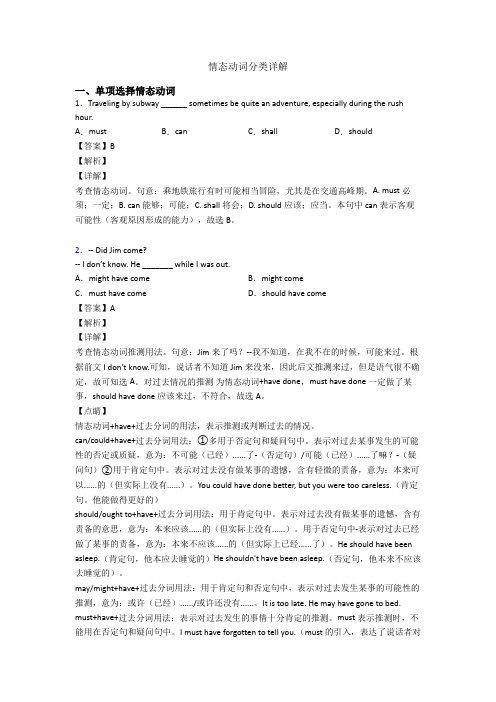
用法:表示对过去已经做了某事的后悔,意为:本来可以不必......的(可实际上却已经......)You needn't have taken a taxi here, for it was very near to my home.
3.Paul did a great job in the speech contest. Hemany times last week.
may/might+have+过去分词用法:用于肯定句和否定句中,表示对过去发生某事的可能性的推测,意为:或许(已经)....../或许还没有......。It is too late. He may have gone to bed.
must+have+过去分词用法:表示对过去发生的事情十分肯定的推测。must表示推测时,不能用在否定句和疑问句中。I must have forgotten to tell you.(must的引入,表达了说话者对过去忘记告诉你的这件事肯定推测)
A.shallB.need
C.willD.can
【答案】A
【解析】
【详解】
考察情态动词用法。句意:——我能用支票付账吗?——对不起,先生。但这是我们酒店的管理规定,支付要用现金。shall可以表示命令,警告,强制,或者指规则和法律要求做的事情。本题正是考察了shall表示按照规则和法律要求做的事情。故A正确。
8.-- Turn off the TV, Jack. _______ your homework now?
-- Mum, just ten more minutes, please.
A.Will you be doingB.Should you be doing
英语情态动词的用法大全含解析百度文库

英语情态动词的用法大全含解析百度文库一、初中英语情态动词1.——Do you have any plans for this summer vacation? ——I'm not sure. I ___ take a trip to Taiwan.A. mustB. needC. mayD. should【答案】C【解析】【分析】句意:一今天暑假你有什么计划吗?一我还不确定。
我可能去台湾去旅行。
A.必须,一定;B.需要,必要;C.可能;D.应该。
根据句中I'm not sure可知,说话人还没有确定的计划,所以这只是一个可能,应选C。
2.All passengers ______ go through safety check before they take a plane.A. canB. mayC. mustD. could【答案】 C【解析】【分析】句意:所有乘客登机前必须接受安全检查。
A. can能够,表示能力;B. may可以,表示许可;C. must必须;D. could可能,可以。
登机前必须安检。
故选C。
【点评】情态动词词义辨析。
以及can、may、must、could四个词的词义和用法。
3.— Sorry, I forgot to take money with me. Maybe I can't buy the book you like.— Mum, you ______ worry about it. We can pay by Alipay (支付宝).A. can'tB. needn'tC. mustn'tD. shouldn't【答案】 B【解析】【分析】句意:——对不起,我忘记带钱了。
也许我不能买你喜欢的书。
——妈妈,你不用担心。
我们可以用支付宝支付。
A. can't不能,指不允许或否定推测;B. needn't 不需,指没必要;C. mustn't不能,表禁止;D. shouldn't不应该,表建议。
初中英语情态动词用法大全
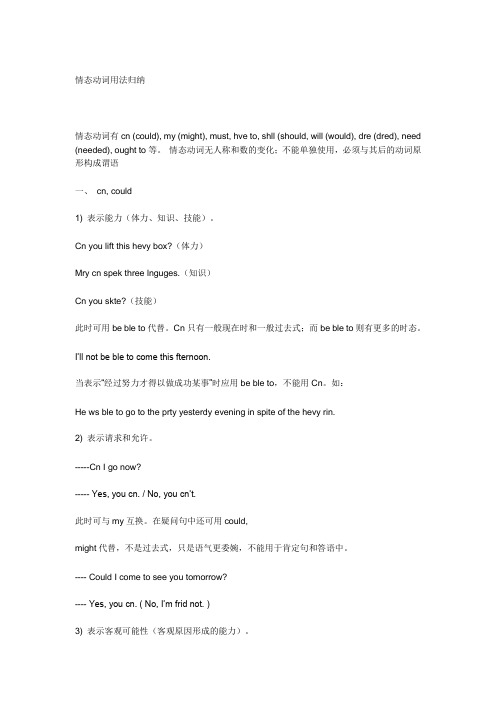
情态动词有cn (could), my (might), must, hve to, shll (should, will (would), dre (dred), need (needed), ought to等。
情态动词无人称和数的变化;不能单独使用,必须与其后的动词原形构成谓语一、cn, could1) 表示能力(体力、知识、技能)。
Cn you lift this hevy box?(体力)Mry cn spek three lnguges.(知识)Cn you skte?(技能)此时可用be ble to代替。
Cn只有一般现在时和一般过去式;而be ble to则有更多的时态。
I’ll not be ble to come this fternoon.当表示“经过努力才得以做成功某事”时应用be ble to,不能用Cn。
如:He ws ble to go to the prty yesterdy evening in spite of the hevy rin.2) 表示请求和允许。
-----Cn I go now?----- Yes, you cn. / No, you cn’t.此时可与my互换。
在疑问句中还可用could,might代替,不是过去式,只是语气更委婉,不能用于肯定句和答语中。
---- Could I come to see you tomorrow?---- Yes, you cn. ( No, I’m frid not. )3) 表示客观可能性(客观原因形成的能力)。
They’ve chnged the timetble, so we cn go by bus insted.This hll cn hold 500 people t lest.4) 表示推测(惊讶、怀疑、不相信的态度),用于疑问句、否定句和感叹句中。
Cn this be true?This cn’t be done by him.How cn this be true?二、my, might1) 表示请求和允许。
专题03 情态动词和虚拟语气(解析版)(全国通用版)-高考英语复习

专题03 情态动词和虚拟语态情态动词★ 情态动词:can, could, may, might, must, ought to, shall, will, would, need ,dare1. 表示推测的情态动词1.1基本原则:1.1.2 对现在或将来情况推测,用情态动词+do / be / be doing…对过去的推测,用情态动词+have done / been…1.1.3表示肯定推测的情态动词,按可能性由大到小依次为:must> should / oughtto>may>might>could1.1.4否定推测,按语气由强到弱依次为:can’t / couldn’t(根本不可能)>may not> mightnot/could not(可能不)。
1.2 具体用法:1.2.1 must be表示推测,意为“一定是……” 只用于肯定句中must have done意为“一定做过某事或某事肯定发生了” 并且有前文铺垫e.g. Listen! There must be some children in the room.The road is wet. It must have rained last night.1.2.2 should (not) / ought (not) to在中表示根据常规或常识推测,表示“某事应该或不应该发生”e.g. It is nearly 7 o’clock. Jack should be here at any moment.You shouldn’t be texting in the class now. We are having a lesson.(should not 含有责备之意)1.2.3 can, could表达推测时,一般用于疑问句和否定句中;can用于肯定句中表示一种理论上的可能性,意为“有时候会…”,并不牵涉是否真的会发生;could用于肯定句中,语气比may/ might更弱。
英语情态动词专项及解析
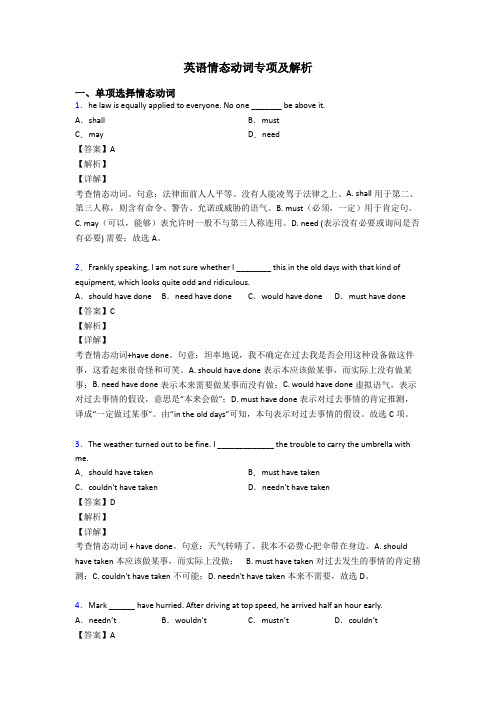
英语情态动词专项及解析一、单项选择情态动词1.he law is equally applied to everyone. No one _______ be above it.A.shall B.mustC.may D.need【答案】A【解析】【详解】考查情态动词。
句意:法律面前人人平等。
没有人能凌驾于法律之上。
A. shall用于第二、第三人称,则含有命令、警告、允诺或威胁的语气。
B. must(必须,一定)用于肯定句。
C. may(可以,能够)表允许时一般不与第三人称连用。
D. need (表示没有必要或询问是否有必要) 需要;故选A。
2.Frankly speaking, I am not sure whether I ________ this in the old days with that kind of equipment, which looks quite odd and ridiculous.A.should have done B.need have done C.would have done D.must have done 【答案】C【解析】【详解】考查情态动词+have done。
句意:坦率地说,我不确定在过去我是否会用这种设备做这件事,这看起来很奇怪和可笑。
A. should have done表示本应该做某事,而实际上没有做某事;B. need have done表示本来需要做某事而没有做;C. would have done虚拟语气,表示对过去事情的假设,意思是“本来会做”;D. must have done表示对过去事情的肯定推测,译成“一定做过某事”。
由“in the old days”可知,本句表示对过去事情的假设。
故选C项。
3.The weather turned out to be fine. I _____________ the trouble to carry the umbrella with me.A.should have taken B.must have takenC.couldn't have taken D.needn't have taken【答案】D【解析】【详解】考查情态动词 + have done。
英语情态动词用法详解

英语情态动词用法详解一、单项选择情态动词1.—Sorry, Mum! I failed the job interview again.—Oh, it's too bad. You________ have made full preparations.A.must B.can C.would D.should【答案】D【解析】【详解】考查情态动词+have done结构。
句意:—对不起,妈妈,我面试又失败了。
—噢,那太糟糕了,你应该做好充分准备的。
A.must必须;B.can可以;C.would将会;D.should应该。
这里是情态+have done的结构的虚拟语气,can+have+done”表示对过去行为的怀疑,用于疑问句,译成“可能做过……吗?”;could+have+done,表示对过去事情的假设,意思是本来能够做某事而没有做;must+have+done”表示对过去事情的肯定推测,译成“一定做过某事”,该结构只用于肯定句;should+have+done意思是“本来应该做某事,而实际没做”。
故选D【名师点睛】情态动词是一种本身有一定的词义,表示说话人的情绪、态度或语气的动词,但它不能单独作谓语,只能和其他动词一起构成谓语。
情态动词是每年高考的热点也是难点,每年单项填空题必考一题。
考点集中在:情态动词表示推测的基本用法及区别,情态动词否定式的用法辨析,“情态动词+have done”的用法区别等。
2.Ann said whenever her father was unhappy he ________ go out and buy something, usually something large and useless.A.should B.couldC.would D.might【答案】C【解析】【详解】考查情态动词。
句意:安说无论什么时候她父亲不高兴的时候,他就会出去买些东西,通常是一些又大又没用的东西。
情态动词知识点(大全)
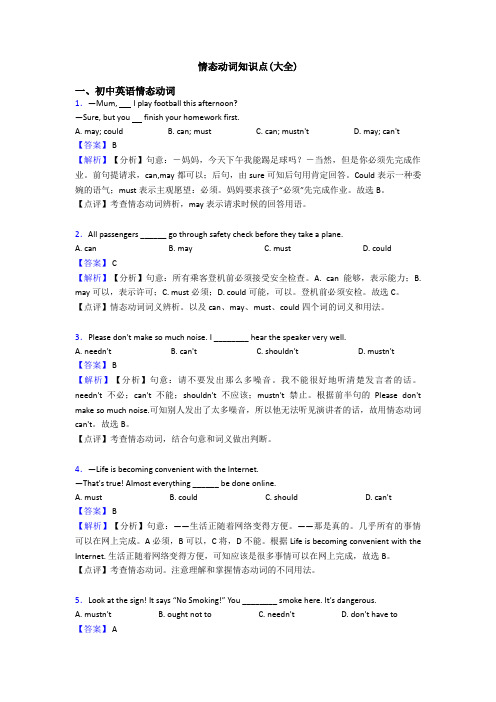
情态动词知识点(大全)一、初中英语情态动词1.—Mum, I play football this afternoon?—Sure, but you finish your homework first.A. may; couldB. can; mustC. can; mustn'tD. may; can't【答案】 B【解析】【分析】句意:-妈妈,今天下午我能踢足球吗?-当然,但是你必须先完成作业。
前句提请求,can,may都可以;后句,由sure可知后句用肯定回答。
Could表示一种委婉的语气;must表示主观愿望:必须。
妈妈要求孩子“必须”先完成作业。
故选B。
【点评】考查情态动词辨析,may表示请求时候的回答用语。
2.All passengers ______ go through safety check before they take a plane.A. canB. mayC. mustD. could【答案】 C【解析】【分析】句意:所有乘客登机前必须接受安全检查。
A. can能够,表示能力;B. may可以,表示许可;C. must必须;D. could可能,可以。
登机前必须安检。
故选C。
【点评】情态动词词义辨析。
以及can、may、must、could四个词的词义和用法。
3.Please don't make so much noise. I ________ hear the speaker very well.A. needn'tB. can'tC. shouldn'tD. mustn't【答案】 B【解析】【分析】句意:请不要发出那么多噪音。
我不能很好地听清楚发言者的话。
needn't不必;can't不能;shouldn't不应该;mustn't禁止。
根据前半句的Please don't make so much noise.可知别人发出了太多噪音,所以他无法听见演讲者的话,故用情态动词can't。
- 1、下载文档前请自行甄别文档内容的完整性,平台不提供额外的编辑、内容补充、找答案等附加服务。
- 2、"仅部分预览"的文档,不可在线预览部分如存在完整性等问题,可反馈申请退款(可完整预览的文档不适用该条件!)。
- 3、如文档侵犯您的权益,请联系客服反馈,我们会尽快为您处理(人工客服工作时间:9:00-18:30)。
情态动词全解析一、何谓―情态动词‖?情态动词主要用来表示说话人的情感、态度等,是中学英语语法的重点,也是高考的热点,是单项填空必考的一个知识点。
情态动词在近五年高考中主要考查四点:情态动词表示推测和可能性的用法;情态动词与虚拟语气;情态动词的表达―情感、态度、语气等‖,情态动词表示―必要性‖等方面的用法。
二、情态动词的特点1.没有人称和数的变化。
2. 有些情态动词有过去式的变化:e.g. will → would , can → could , may→ might ,d are → dared三、情态动词的否定形式情态动词+ not +动词原形can not: can't , must not: mustn't , need not : needn't四、情态动词的用法及相互间的区别[★★★]五、情态动词的解题例析(1) 认真审题,结合所给出的语境,正确把握说话者的语气、情感、态度、观点等。
(2) 认真思考所给选项中情态动词的基本特征和用法,并结合语境推敲答案。
(3) 要注意把握时间概念。
情态动词无论是表达“推测和可能性”,还是表达“虚拟”这一概念,只要是对过去已经发生的事情进行描述,一律用“情态动词+have done”这一结构;对现在或将来的事情进行描述,用“情态动词+动词或系动词原形”。
★下面我们来看看常考的一些情态动词★以下试题均来源于往年的高考试题,具有很强的针对性(一)情态动词表示推测和可能性的用法(1) must表示推测,意为―一定……‖,只能用于肯定句中。
must have done意为:一定做过某事或某事肯定发生了。
例如:—She looks very happy. She ______ have passed the exam.—I guess so. It’s not difficult after all.A. shouldB. couldC. mustD. might(2) should (not) / ought (not) to在中表示根据常规或常识推测,表示―某事应该或不应该发生‖,语气比must或can’t / couldn’t稍弱。
例如:—How’s your tour around the North Lake? Is it beauti ful?—It ________ be, but it is now heavily polluted.A. willB. wouldC. shouldD. must②There _________ be any difficulty about passing the road test since you have practiced a lot in the driving school.A. mustn’tB. shan’tC. shouldn’tD. needn’t(3) can, could表达推测时,一般用于疑问句和否定句中;can用于肯定句中表示一种理论上的可能性,并不牵涉是否真的会发生,在这种用法中can只能与动词原形连用;could用于肯定句中,语气比may/ might更弱。
例如:①You ______ be hungry already — you had lunch only two hours ago!A. wouldn’tB. can’tC. mustn’tD. needn’t②She ______ have left school, for her bike is still here.A. can’tB. wouldn’tC. shouldn’tD. needn’t③It is usually warm in my hometown in March, but it _____ be rather cold sometime.A. mustB. canC. shouldD. would④Peter ____ be really difficult at times even though he’s a nice person in general.A. shallB. shouldC. canD. must(4)may (not) / might (not)表达一种不太把握的推测,意为―或许,可能‖;might的语气比may 较婉转。
① Liza ___ well not want to go on the trip --- she hates traveling.A. willB. canC. mustD. may②Although this ____ sound like a simple task, great care is needed.A. mustB. mayC. shallD. should③—I can’t find my purse anywhere.—You __ have lost it while shopping.A. mayB. canC. shouldD. would(二)表达虚拟语气的情态动词对过去的一种结果的假设或虚拟,用情态动词+have done这一结构,常用的有以下几个情态动词:(1) should (not) / ought (not) to have done本(不)应该做某事,但却没有做或做了,含有责备或后悔之意。
例如:—I’m sorry. I _________at you the other day.—Forget it. I was a bit out of control myself.A. shouldn’t shoutB. shouldn’t have shoutedC. mustn’t shout C. mustn’t have shouted(2) could have done本来能够做某事但未做。
例如:Thank you for all your hard work last week. I don’t think we ______ it without you.A. can manageB. could have managedC. could manageD. can have managed(3) needn’t have done本没有必要做某事但却做了。
要注意needn’t do则表达―没有必要去做某事‖,时间上应该是现在或将来。
例如:①—Catherine, I have cleaned the room for you.—Thanks. You ________ it. I could manage it myself.A. needn’t doB. needn’t have doneC. mustn’t doD. shouldn’t have done② The boss has given everyone a special holiday, so we go to work tomorrow.A. can’tB. mustn’tC. needn’tD. shouldn’t(4)would (not) have done本来(不)会发生某事,但却(发生了)或没有发生。
常用于虚拟条件句或含蓄虚拟条件引导的虚拟语气,表示对过去所发生事情结果的假设。
例如:He hesitated for a moment before kicking the ball, otherwise, he ________ a goal.A. had scoredB. scoredC. would scoreD. would have scored(5) might have done表示―本来可能……‖,但实际上没有发生的事。
例如:What a pity! Considering his ability and experience, he ________ better.A. need have doneB. must have doneC. can have doneD. might have done (三)表达―情感、态度、语气‖ 等方面的情态动词1. must表达―情感、态度、语气‖主要有以下用法:(1) 表示主观的义务和必要,主要用于肯定句和疑问句,意思为―必须……,得……,要……‖;由must引起的疑问句,肯定回答要用must或have to,否定回答要用needn’t或don’t have to,意思是―不必‖。
另外,must与have to都可以表示―必须‖这一含义。
must表示一种主观的需要,而have to表示一种客观的需要,意思是―不得不‖,其否定形式是don’ have to。
例如:-What sort of house do you want to have? Something big?--Well, it ______ be big--that's not important.A. mustn'tB. needn'tC. can'tD. won't(2) must的否定形式mustn’t表示禁止,意思是―不能,不许‖。
例如:When I was young, I was told that I ______ play with matchesA. wouldn'tB. needn'tC. mustn'tD. daren't(3) must用于条件句或疑问句中,可以用来表示责备、抱怨的感情色彩,意思为―偏要,硬要、干嘛‖。
①—May I smoke here?—If you ____, choose a seat in the smoking section.A. shouldB. couldC. mayD. must②John, look at the time. ___________ you play the piano at such a late hour?A.Must B.Can C.May D.Need2. should(1) should应该,表示―责任和义务‖。
例如:According to the air traffic rules, you ___ switch off your mobile phone before boarding.A. mayB. canC. wouldD. should(2) 在虚拟条件句中用以加强假设语气,表示―与将来事实相反的假设‖,用If+主语+ should +动词原形,当―万一(会)‖讲。
